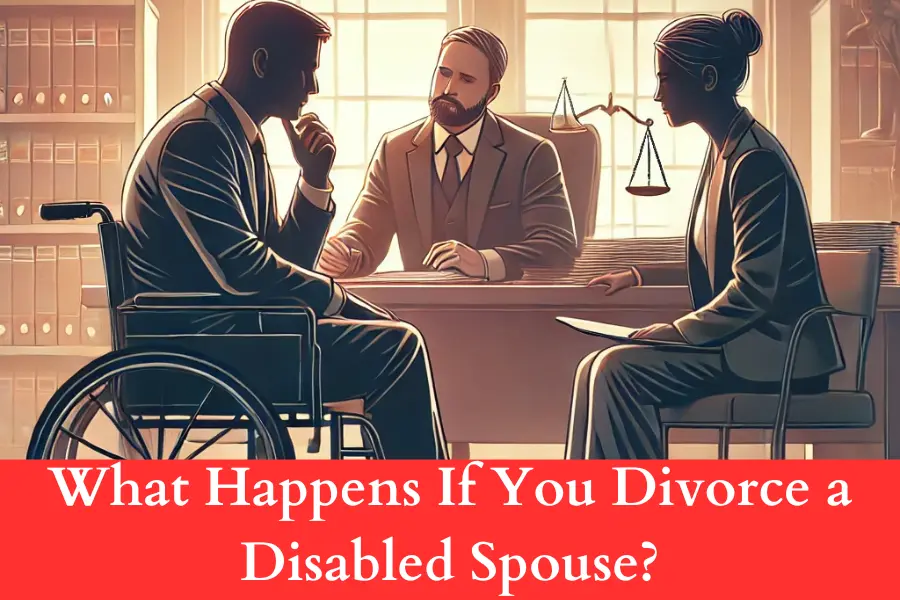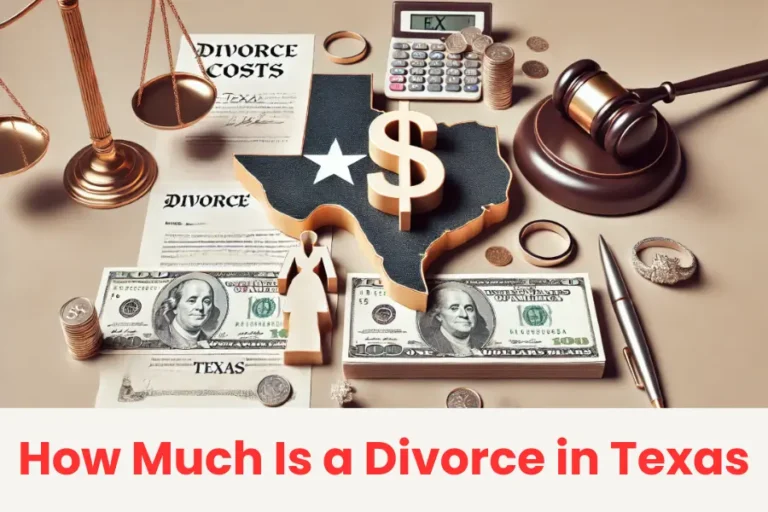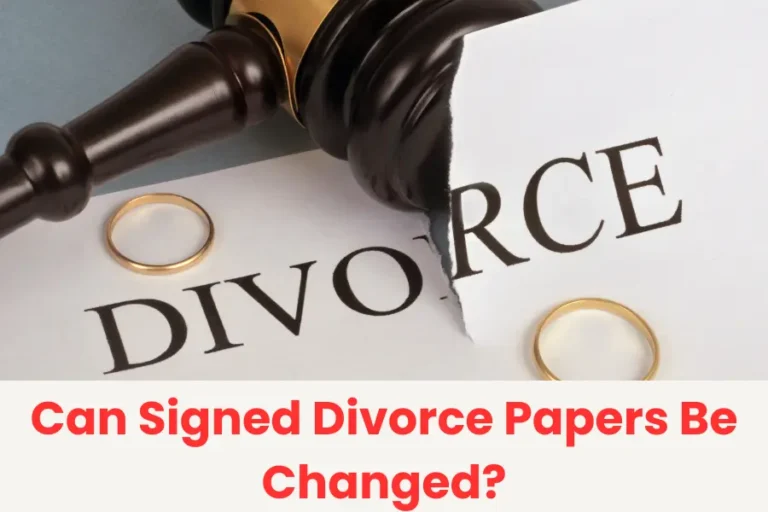What Happens If You Divorce a Disabled Spouse? (Simple Guide)
Thinking about what happens if you divorce a disabled spouse can be overwhelming. You might wonder, “Will I have to pay more alimony? What about their medical care or benefits?” It’s natural to feel stressed, but understanding the process can really help you feel in control.
The truth is, divorcing a disabled spouse isn’t the same as a regular divorce. Courts consider things like disability benefits, caregiving needs, and even health insurance.
But don’t worry. With some guidance, you can handle this in a way that’s fair.
Key Points
- Alimony for a disabled spouse might be longer-term or higher based on their needs.
- Asset division considers disability-related expenses, like medical bills or equipment.
- Disability benefits like SSDI are usually protected but may influence settlements.
- Health insurance can change after divorce, with COBRA or Medicaid as options.
- Caregiving arrangements may shift, requiring outside help or new solutions.
- Child custody decisions focus on the best interests of the child, even with a disabled parent.
- Nevada’s community property laws ensure assets are divided fairly in these cases.
- Planning with legal and financial experts can make the process much smoother.
What Happens if You Divorce a Disabled Spouse?
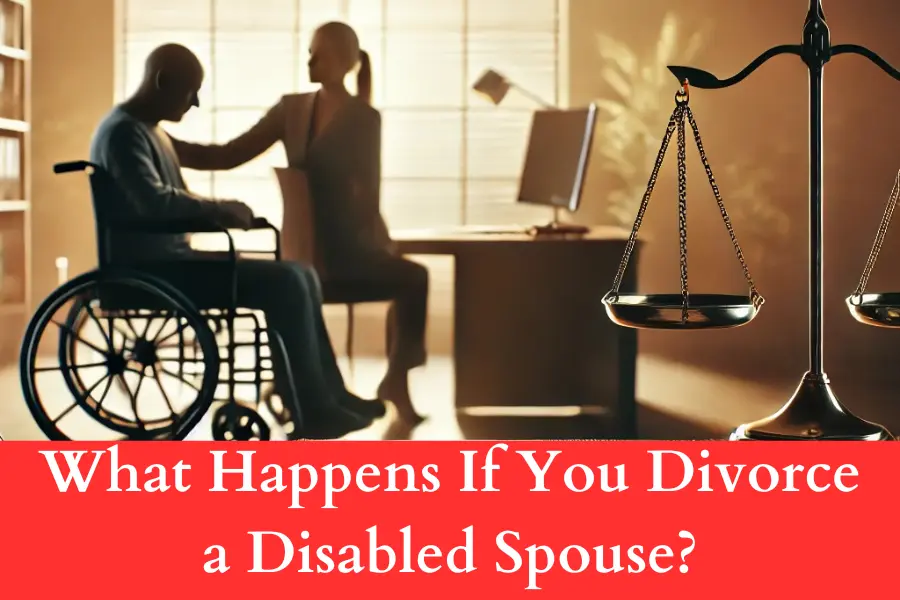
Divorcing a disabled spouse can be a little more complicated than a typical divorce because it brings up unique questions about money, healthcare, and caregiving. Things like spousal support, child custody, and even health insurance can all be affected.
Let’s talk about each of these in detail so you can understand what might happen.
Financial Support (Spousal Maintenance or Alimony)
Divorcing someone with a disability usually means the court looks more closely at alimony. Why? Because a disabled spouse might not be able to work or earn enough money to support themselves.
First, if the disability limits their ability to work, the court might order longer or even lifetime alimony payments. This is especially true if the disabled spouse can’t become self-sufficient. Judges don’t want them to struggle just because of the divorce.
Second, if the disability happened during the marriage, courts often think of it as a shared responsibility. The non-disabled spouse might be asked to help out more financially because the couple faced the challenges of the disability together.
Lastly, disability benefits like Social Security can also play a role. Sometimes these benefits are considered part of the spouse’s income, but they don’t always cover enough. That’s where alimony steps in to fill the gap.
Division of Assets
Splitting up your property and money can get tricky when one spouse has a disability. Courts want to be fair, but they also look at the extra expenses the disabled spouse might face.
First, if you live in an “equitable distribution” state, the judge divides assets based on what’s fair, not just a simple 50-50 split. A disabled spouse might get more of the assets because they’ll need extra money for living expenses or medical care.
Second, medical costs related to the disability can affect the outcome. If the couple used up savings or racked up debt to pay for treatments, the court might adjust the division of property to make up for that.
Lastly, things like wheelchairs, medical equipment, or a home that’s been modified for accessibility are usually given to the disabled spouse. These items are essential for their day-to-day life.
Health Insurance and Medical Needs
Health insurance is a big deal when a disabled spouse is involved. Divorce can change everything if one spouse relies on the other’s insurance.
First, if the disabled spouse was covered under their partner’s employer-sponsored plan, that coverage usually ends after the divorce. Losing this can be a huge blow because healthcare is often a lifeline for someone with a disability.
Second, there are options to keep the same insurance temporarily, like COBRA, but it’s expensive. If that’s not affordable, they’ll have to find new insurance through Medicaid or the Affordable Care Act marketplace.
Finally, the court might require the non-disabled spouse to help pay for healthcare or medical treatments, especially if the disabled spouse needs them to stay healthy. This could be part of the alimony or settlement.
Disability Benefits and Income
Disability benefits like SSDI or SSI are important for many disabled spouses, but divorce can complicate things.
First, if the disabled spouse gets SSDI (Social Security Disability Insurance), those payments don’t usually change after a divorce. However, if the non-disabled spouse was receiving spousal SSDI benefits based on their partner’s work record, they might lose those payments.
Second, SSI (Supplemental Security Income) is different because it’s based on need. If the disabled spouse gets a lump sum of money in the divorce, it could temporarily disqualify them from SSI until their assets go back below the limit.
Finally, the court tries to avoid disrupting these benefits when dividing assets or calculating alimony. This is important because losing these benefits could create financial problems for the disabled spouse.
Caregiving Arrangements
Caregiving is a big part of many marriages where one spouse has a disability. After a divorce, new plans usually need to be made.
First, if the non-disabled spouse was the main caregiver, they won’t be required to keep doing that after the divorce. Courts generally focus on setting up professional caregiving or involving family members who are willing to help.
Second, hiring a professional caregiver can be expensive. The court might adjust the financial settlement to account for this. Sometimes, alimony payments are increased to cover the cost.
Lastly, the disabled spouse might need to rely more on community resources or programs for support. It’s important to have a plan in place for caregiving before the divorce is finalized.
Child Custody and Support (If Applicable)
If there are kids involved, the court will focus on what’s best for them. A parent’s disability doesn’t automatically mean they lose custody.
First, judges look at whether the disabled spouse can care for the children. If they can, they might get shared or even full custody. If they need help, the court might arrange for extra support like in-home care.
Second, if the non-disabled parent takes primary custody, they’ll probably have to pay child support. If the disabled parent has extra caregiving expenses, the non-disabled parent might need to contribute more.
Lastly, the court usually works to maintain the bond between the kids and the disabled parent. Even if physical limitations make full custody difficult, visitation and other arrangements can help keep the relationship strong.
If you’re in South Carolina and considering divorce, you might also wonder how to avoid the one-year waiting period. Check out these four ways to get a divorce in SC without the wait.
Can You Receive Disability and Alimony at the Same Time?
Yes, you can receive disability benefits and alimony at the same time, but it depends on your situation. Disability benefits, like Social Security Disability Insurance (SSDI), are based on your work history and not your income. Alimony, on the other hand, is money your ex-spouse pays to support you after a divorce. Courts usually treat these separately.
However, if you receive Supplemental Security Income (SSI), things can get tricky. SSI is a need-based program, so if you get a large alimony payment, it might reduce your SSI benefits. This is because SSI has strict income and asset limits, and alimony counts as income.
It’s a good idea to talk to a lawyer or benefits counselor if you’re in this situation. They can help you understand how alimony might affect your disability benefits and work to create a plan that protects your financial stability.
Disabled Divorced Spouse Benefits
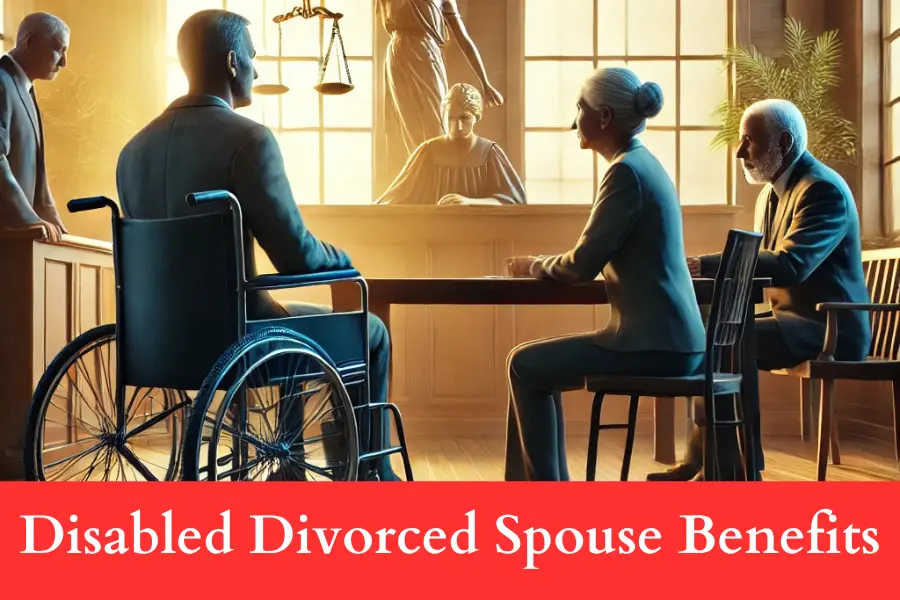
If you’re a disabled spouse going through a divorce, you might be eligible for extra help. For example, if your ex-spouse worked long enough and paid into Social Security, you could qualify for benefits based on their record. This doesn’t reduce their benefits, but it gives you financial support.
To qualify for these benefits, you generally need to have been married for at least ten years and be over 50 years old if you’re disabled. If you meet these requirements, you can receive up to 50% of your ex-spouse’s benefits while keeping any benefits you already have.
These benefits can be a lifeline, especially if your disability makes it hard to work. They’re separate from alimony, so receiving these won’t affect your ex’s responsibility to pay spousal support. It’s a good idea to contact Social Security to see what you qualify for.
What is the Divorce Rate for a Disabled Spouse?
Divorce rates tend to be higher in marriages where one spouse has a disability. It is around 75 percent. It means 3 out of every 4 couples end up divorcing. This is often due to the added stress and responsibilities that come with managing a disability.
When a spouse becomes disabled, the dynamic of the relationship can change. The non-disabled spouse might take on caregiving roles, which can lead to burnout and emotional strain. On the other side, the disabled spouse may feel dependent or frustrated, creating tension.
Despite these challenges, many couples work through the difficulties together. Support groups, counseling, and open communication can make a huge difference.
Not all divorces are the end of the road. If you’re thinking about reconciliation, here’s how to win her back after divorce with these proven tips.
Disability and Divorce Settlement
Divorce settlements involving a disabled spouse can be more complex than usual. Courts look at the financial needs of both spouses and consider how the disability impacts those needs. The goal is to ensure that the disabled spouse has enough support to maintain their quality of life.
For example, the disabled spouse might get a larger share of marital assets to cover ongoing medical expenses or living costs. If they can’t work, the court may also award higher or longer-term alimony payments to help them stay financially stable.
Another factor is disability benefits. Courts usually try not to interfere with these, as they are often the primary source of income for the disabled spouse. A skilled lawyer can help you navigate this process to ensure a fair settlement that takes the disability into account.
Can I Get Alimony if My Husband is on Disability?
Yes, you can get alimony even if your husband is on disability, but it depends on the specifics of your case. Courts look at factors like your financial needs, your husband’s income, and his ability to pay. Disability income is considered when calculating what he can afford to contribute.
If your husband receives SSDI, that’s treated as income, and alimony can be awarded based on it. However, if he’s on SSI, it’s a bit different. SSI is need-based, so courts usually won’t include it as income when deciding alimony because it’s meant for basic living needs.
Keep in mind that the amount of alimony might be lower if your husband’s disability limits his income. Talking to a lawyer can help you understand what’s possible and how to present your case to ensure you get the support you need.
What Happens if You Divorce a Disabled Spouse in Nevada?
In Nevada, divorcing a disabled spouse involves specific considerations. Nevada is a “community property” state, which means marital assets are typically split equally. However, the court can consider the financial needs of a disabled spouse when dividing property.
When it comes to alimony, the court looks at whether the disabled spouse can support themselves. If they can’t work or have significant medical expenses, the non-disabled spouse might be ordered to pay long-term alimony. Nevada courts aim to ensure the disabled spouse isn’t left struggling financially.
Healthcare is another concern. If the disabled spouse relies on their partner’s health insurance, they’ll need to find a new plan after the divorce. Medicaid or other programs might step in to fill the gap. It’s important to plan ahead to make sure their needs are covered.
Divorcing a disabled spouse might involve extra considerations, especially if you’re in Oklahoma. Learn how to file for divorce there in just five steps.
Conclusion
In summary:
- Courts take disability into account to ensure fair support and asset division.
- A disabled spouse’s benefits like SSDI or SSI might influence alimony but usually remain intact.
- Health insurance, caregiving needs, and financial planning are key areas to address.
- Working with professionals can help you make informed and fair decisions.
- Remember, even though divorce is tough, with the right steps, you can move forward with confidence.
That’s all.

